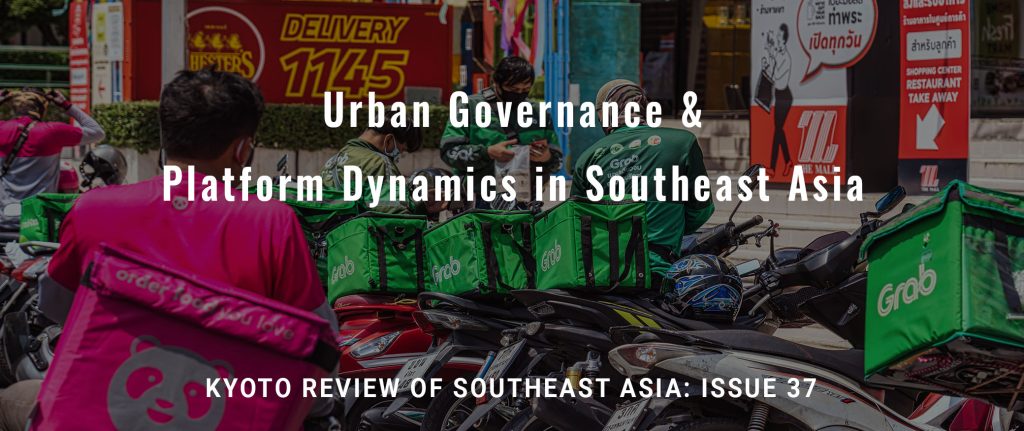The rapid digital transformation in Southeast Asian cities, largely propelled by homegrown platform companies such as Grab, Go-Jek, Lazada, and Shopee, has significantly reshaped daily life, economies, and urban environments. These companies have fundamentally altered how individuals interact with services and businesses, leaving an indelible mark on urban landscapes and economic structures across the region. In conjunction with the transformative force of these private-sector platforms, several issues regarding platformization and urban governance require in-depth exploration. This issue of the Kyoto Review of Southeast Asia comprises five articles that delve into various aspects of urban platformization in Southeast Asian cities.
Andrew Stokols investigates how the notable shift toward “platform governance” is increasingly prominent in Thailand, with political actors embracing digital platforms to realize their governance objectives. Stokols underscores that Governor Chadchart Sittipunt’s administration in Bangkok, which introduced Traffy Fondue, a citizen complaint platform that drastically reduced response times for urban issues, showcases the potential of digital platforms for effective governance. Similarly, Mayor Kanop Ketchart initiated a “human-centric smart city” project in Nakhon Si Thammarat, leveraging Line-based platforms to enhance citizen engagement and tackle urban challenges. Nonetheless, as highlighted by Stokols, the success of these innovations hinges on more profound institutional and political reforms, raising concerns surrounding transparency, accountability, and the distribution of power in these digitally mediated systems.
In their exploration of Indonesia, Asri Septarizky and Hasanatun Nisa Thamrin delve into the impact of the digital revolution on political participation. With a substantial portion of the population connected through social media, political engagement has undergone a seismic shift. Citizens employ social platforms to voice their opinions and engage with local authorities. Yet, this transformation has given rise to a dichotomy between “invited” and “invented” civic engagement spaces. Formal government-led channels, such as e-musrenbang, often lack meaningful community involvement and may curtail representation. In contrast, younger citizens are adopting an insurgent approach to urban planning outside formal settings, raising questions about the translation of online activism into tangible change and potential exclusionary tendencies in digital participation. The proposed solution revolves around a collaborative approach between citizens and the government, emphasizing inclusivity, shared understanding, and co-production of digital platforms to facilitate meaningful participation in shaping cities that cater to the interests of all citizens.
However, the governance issue becomes intricate when a global corporation is a key player, as emphasized by Guanie Lim and Yat Ming Ooi. They focus on the Digital Free Trade Zone (DFTZ) in Malaysia, a collaborative venture with Alibaba, a major Chinese transnational corporation. The DFTZ was established to propel Malaysia’s digital transformation and upgrade its industrial ecosystem. Nevertheless, concerns regarding the project’s effectiveness, its detachment from local businesses, and the overwhelming foreign ownership of the DFTZ have surfaced. This dominance limits local control over technical expertise and potentially impedes Malaysia’s progress in the digital economy. Lim and Ooi suggest alternative governance models that prioritize genuine digital transformation and the enhancement of Malaysia’s economy.
Gerard McCarthy sheds light on governance responses to the gig economy in Southeast Asia, particularly against the backdrop of the COVID-19 pandemic. The gig economy has witnessed substantial growth, but gig workers often grapple with precarious working conditions and a lack of social protection. McCarthy scrutinizes the responses of governments in the region, using Thailand and Singapore as case studies. In Thailand, a pro-competition approach has been adopted, fostering increased competition among gig companies while weakening worker safety nets. In contrast, Singapore has introduced technocratic interventions to address worker grievances and social issues, such as mandating insurance coverage and contributions to a government-regulated savings account. McCarthy concludes that governance responses are shaped by existing social models and the responses of political regimes to labor agitation, with innovation often taking precedence over labor market intervention. However, this prioritization could perpetuate the precarity of gig workers in Southeast Asia.
Lastly, Akkanut Wantanasombut addresses labor-related challenges confronted by ride-hailing and food delivery platform workers in Thailand. These challenges encompass reduced wages, algorithm malfunctions, alterations in working conditions, and the absence of accident insurance. The article underscores how intensified competition among riders has compelled them to work longer hours to sustain their income, giving rise to concerns about their well-being. Despite common challenges, riders’ unity is hampered by their divergent goals and plans, along with deficiencies in Thai labor laws that inadequately protect platform workers. These riders have turned to social media platforms to organize and articulate their demands. Nevertheless, the absence of institutional support and regulatory clarity has hindered their mobilization efforts. Achieving riders’ solidarity and their ability to address their labor issues necessitates a comprehensive and nuanced approach that considers their unique circumstances and demands, as elucidated by Wantanasombut.
Apiwat Ratanawaraha
Department of Urban and Regional Planning
Faculty of Architecture, Chulalongkorn University, Thailand
Main Articles in Seven Languages
Article 1
Doing more with less? Possibilities and limitations of platform governance in post-coup Thailand
- Melakukan Lebih Banyak dengan Kerja Lebih Sedikit? Kemungkinan dan Keterbatasan Tata Kelola Platform di Thailand Pasca-Kudeta
- ทำน้อยได้มาก? ความเป็นไปได้และข้อจำกัดของการบริหารรัฐกิจด้วยระบบแพลตฟอร์มในประเทศไทยยุคหลังรัฐประหาร
- 少ない労力でより多くを行う? クーデター後のタイにおけるプラットフォームガバナンスの可能性と限界
- Làm nhiều hơn với ít hơn? Khả năng và hạn chế của quản trị platform ở Thái Lan sau đảo chính
- Paggawa nang higit sa pamamagitan nang mas kaunti? Mga posibilidad at limitasyon ng pamamahala sa pamamagitan ng platform sa Thailand matapos ang kudeta
- လျှော့လုပ်ခြင်းဖြင့် ပိုအကျိုးဖြစ်လေသလား အာဏာသိမ်းပြီးနောက် ထိုင်းနိုင်ငံတွင် ပလက်ဖောင်းအုပ်ချုပ်ရေး၏ ဖြစ်နိုင်ခြေများနှင့် ကန့်သတ်ချက်များ
Article 2
Platformizing participation in Indonesian cities
- Platformisasi Keterlibatan Warga di Kota-kota di Indonesia
- การใช้แพลตฟอร์มเพื่อการมีส่วนร่วมในเมืองต่างๆ ของอินโดนีเซีย
- インドネシアの都市における参加のプラットフォーム化
- Nền tảng hóa sự tham gia ở các thành phố của Indonesia
- Pamagat: Platpormisasyon ng Pakikilahok sa mga Kalunsuran ng Indonesia
- ခေါင်းစဉ်- အင်ဒိုနီးရှားမြို့ကြီးများရှိ ပလက်ဖောင်း တွင် ပူးပေါင်းပါဝင်မှု
Article 3
Platformizing Malaysia’s economy: New wine in an old bottle?
- Platformisasi Ekonomi di Malaysia: Anggur Baru dalam Botol Lama?
- การเปลี่ยนผ่านสู่ธุรกิจแพลตฟอร์มของระบบเศรษฐกิจมาเลเซีย: เหล้าใหม่ในขวดเก่า?
- マレーシア経済のプラットフォーム化(瓶は古いが、中身のワインは新しい?)
- Nền tảng hóa kinh tế Malaysia: Có phải rượu mới trong một cái bình cũ?
- Platpormisasyon ng Ekonomiya ng Malaysia: Bagong Alak sa Lumang Lalagyan?
- မလေးရှားနိုင်ငံ၏စီးပွားရေးကို ပလက်ဖောင်းဖြစ်စေခြင်း ပုလင်းဟောင်းတွင် ဝိုင်အသစ်ထည့်ခြင်းလား
Article 4
The end of laissez-fair? Gig economy governance in post-pandemic Singapore and Thailand
Akhir dari Laissez-Faire? Tata Kelola Ekonomi Gig di Singapura dan Thailand Pasca-Pandemi
จุดจบของธุรกิจเสรี? การควบคุมเศรษฐกิจสัญญาจ้างชั่วคราวในสิงคโปร์และประเทศไทยยุคหลังโควิด-19
自由競争主義は終わりか? パンデミック後のシンガポールとタイにおけるギグエコノミー・ガバナンス
Sự kết thúc của Lí thuyết Tự do phóng nhiệm (Laissez-Fair)? Quản trị nền kinh tế truy cập ở Singapore và Thái Lan sau đại dịch
Ang Wakas ng Laissez-Fair? Pamamahala sa ekonomiyang gig sa Singapore at Thailand matapos ang pandemya
လေဆဲဖဲလ်စီးပွားရေးစနစ် (Laissez-Faire) ၏အဆုံးသတ်လေလား စင်္ကာပူနှင့် ထိုင်းနိုင်ငံတို့တွင် ကိုဗစ်-၁၉ ကပ်ရောဂါအလွန် အလွတ်တန်း စီးပွားရေး (gig economy)ကို ထိန်းကျောင်း အုပ်ချုပ်ခြင်း
Article 5
Flexibility, Security, and the Quest for Unity in Platform Work: A Case of Riders from Thailand
Fleksibilitas, Keamanan, dan Menggapai Persatuan dalam Kerja Platform: Kasus Ojol dari Thailand
ความยืดหยุ่น ความมั่นคง และการแสวงหาความเป็นน้ำหนึ่งใจเดียวกันในงานแพลตฟอร์ม: กรณีศึกษาไรเดอร์จากประเทศไทย
プラットフォーム労働の柔軟性と安定性、結束を求めて タイのライダーの事例
Tính linh hoạt, bảo mật và tìm kiếm sự thống nhất trong công việc nền tảng: Trường hợp các lái xe ở Thái Lan
Pleksibilidad, Seguridad, at ang Paghahanap ng Pagkakaisa sa Trabahong Platform: Isang Kaso ng mga Rider mula sa Thailand
ပြောင်းလွယ်ပြင်လွယ်ရှိမှု၊ လုံခြုံရေးနှင့် ပလက်ဖောင်းအလုပ်တွင် စည်းလုံးမှုရှာဖွေခြင်း – ထိုင်းနိုင်ငံမှ ကယ်ရီသမားများ၏ ဖြစ်ရပ်
Book reviews from Issue 37 Kyoto Review of Southeast Asia, (March 2024)
Author: Al-Fadhat, Faris Palgrave McMillan, 2019 Reviewed by Nandito Oktaviano |
Author: Bolotta, Giuseppe Copenhagen: NIAS Press, 2021 Reviewed by Janepicha Cheva-Isarakul |
Author: Khoo Ying Hooi Singapore, ISEAS – Yusof Ishak Institute, 2020 Reviewed by Yukiko Taniguchi |
Edited by: Jenny Hedström and Elisabeth Olivius Norway, NIAS Press, 2022 Reviewed by Elliott Prasse-Freeman |
Author: Supalak Ganjanakhundee Singapore: ISEAS – Yusof Ishak Institute, 2022 Reviewed by Gregory Raymond |

